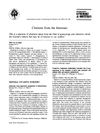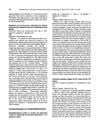 March 2014 in “Fertility and Sterility”
March 2014 in “Fertility and Sterility” The April 2014 issue of "Fertility and Sterility" discussed various reproductive health topics, including hormone therapy benefits, sperm and genetic factors in male infertility, and the link between PCOS and diabetes.
 9 citations,
August 1952 in “The Journal of Clinical Endocrinology & Metabolism”
9 citations,
August 1952 in “The Journal of Clinical Endocrinology & Metabolism” A 17-year-old female with adrenogenital syndrome produces very high levels of androgens, which prevent complete feminization despite high estrogen doses.
 6 citations,
August 2013 in “Fertility and Sterility”
6 citations,
August 2013 in “Fertility and Sterility” Eating cream can increase ovarian androgen production in women with Polycystic Ovary Syndrome, which is not related to obesity.
 August 2013 in “Fertility and Sterility”
August 2013 in “Fertility and Sterility” PCOS may be influenced by factors in the blood, not just the ovaries.
 3 citations,
June 1995 in “International Journal of Gynecology & Obstetrics”
3 citations,
June 1995 in “International Journal of Gynecology & Obstetrics” Laser laparoscopy effectively reduces pelvic pain in women with mild to moderate endometriosis and is safe to use.
 June 1995 in “International Journal of Gynecology & Obstetrics”
June 1995 in “International Journal of Gynecology & Obstetrics” The new method showed that endometriotic tissue has lower estrogen receptor levels but similar progesterone levels compared to normal endometrium, with both following a similar cycle.
 3 citations,
January 1992 in “Gynecological Endocrinology”
3 citations,
January 1992 in “Gynecological Endocrinology” 3α, 17β-androstanediol-glucuronide is not a useful marker for androgen excess but may help monitor certain treatments.
 September 1997 in “JEADV. Journal of the European Academy of Dermatology and Venereology/Journal of the European Academy of Dermatology and Venereology”
September 1997 in “JEADV. Journal of the European Academy of Dermatology and Venereology/Journal of the European Academy of Dermatology and Venereology” Psychological factors play a significant role in developing alopecia areata.
 12 citations,
January 2004 in “Reproductive biomedicine online”
12 citations,
January 2004 in “Reproductive biomedicine online” Low-dose anti-androgen drugs and certain drug combinations are effective for hirsutism, and insulin sensitizers show promise, especially for those with polycystic ovarian syndrome.
 27 citations,
January 2018 in “Curēus”
27 citations,
January 2018 in “Curēus” Subcutaneous contraceptives can cause side effects like menstrual changes, headaches, weight gain, and pain at the implant site.
 51 citations,
April 1999 in “The Journal of Steroid Biochemistry and Molecular Biology”
51 citations,
April 1999 in “The Journal of Steroid Biochemistry and Molecular Biology” Testosterone replacement may improve sexual desire and bone health in women with low androgen levels, but more research is needed on its long-term safety.










